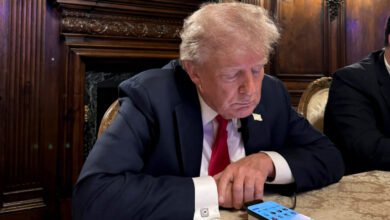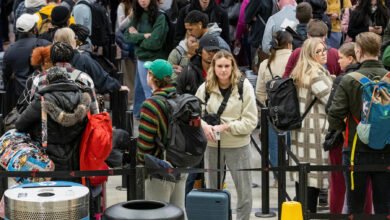Does Trump Have a Mandate? Plus, Airlines Hope for Friendlier Federal Skies.
Let’s look at some high-flying hopes and dreams, and some outstanding questions regarding Trump 2.0.
The dust is slowly settling in the aftermath of President-elect Donald Trump’s victory. He has delivered a suite of nominees to major posts. News outlets are trying to figure out what those picks mean and what he’ll prioritize. The private sector is watching, too.
In the past, Decision Points has delivered a Friday news roundup of state and local news (or just overlooked but interesting trends). This week, we’re going to look at expectations for Trump 2.0 – and maybe rant a little about the talk of a presidential mandate, or the absence of one.
The Looming Immigration Clash Between Feds and Locals
Trump has repeatedly said that one of his Day One priorities will be to launch a mass deportation program to push out millions of immigrants in the country illegally. This week, he seemingly confirmed he would invoke a national emergency and use “military assets” to carry out the plan.
There are a lot of questions swirling around this initiative: Will it weather the legal challenges that will inevitably pop up? How will the feds locate and round up the immigrants? Where will they be housed, pending deportation? What vehicles will the U.S. use to transport them out of the country? How will Trump convince other countries to take in millions of people?
(We’re not adding, “How much will it cost?” here because those comfortable with mass roundups and detentions reminiscent of the World War II imprisonment of people of Japanese descent – two-thirds of them U.S. citizens – probably won’t balk at any price tag.)
- But here’s another looming problem: How hard will blue states and cities – or Democratic leaders in states won by Trump – resist? And how will Trump respond?
It’s not academic.
Will so-called sanctuary locales, which can forbid local police from helping with federal immigration enforcement, decline to help? Will they seek legal remedies? Some leaders have vowed to stand in the way as much as they can.
In Colorado, Democratic Gov. Jared Polis recently told Colorado Public Radio he’d welcome federal help to detain criminals and gang members – but that’s it.
“Obviously, the fear is (Trump’s) talking about going after law-abiding Coloradans who might’ve lived here for 20, 30 years, who are working as construction workers or in ag or in the hospitality industry,” Polis said. “And obviously it would devastate our economy and our society if someone were to come in and forcibly take our neighbors away from us.”
Airlines Hope for ‘Fresh Air’
One of the hallmarks of President Joe Biden’s time in office has been what I dubbed a “quality of life” campaign targeting modern nuisances many consumers hate: Resort fees! Airline cancellations! Hidden costs for travel! Credit card late-payment charges!
Now, at least some airline CEOs seem to be relishing the prospects that Trump could roll back some Biden-era rules.
- Delta Airlines CEO Ed Bastian recently said Trump’s approach to regulation could be “a breath of fresh air” after four years of government “overreach.”
- Southwest Airlines CEO Robert Jordan seems to share that view.
- “I think there is a general thought that the new administration could be a little more business-friendly,” Jordan said. “We are hopeful for a (Department of Transportation) that is maybe a little less aggressive in terms of regulating or rulemaking.”
Trump is nominating former Rep. (and Fox Business channel host) Sean Duffy to be secretary of transportation – a choice hailed by Nicholas Calio, who heads the Airlines for America industry group.
“Congressman Duffy has a proven track record for getting things done, and we are eager to collaborate with him on key issues impacting the U.S. airline industry,” Calio said.
(Trump said Duffy would be “ushering in The Golden Age of Travel” and promised the nominee would “greatly elevate the Travel Experience for All Americans!”)
The ‘Mandate’ Debate
In theory, using the outcome of a presidential election to claim a mandate for your agenda is straightforward: You want to assert popular support for your policy proposals, and maybe make opponents think twice. Those critics, meanwhile, want to undermine that support.
And so we have seen a fight this year over the popular vote. Trump supporters were thrilled with early numbers suggesting he had won more than 50% of it. As results from late-counting states (what gives, California?) come in, it appears clear that he will fall short.
This may all matter to terminally online partisans, but it’s a pretty sterile conversation. Trump’s power in Washington will come from the presidency’s constitutional role and the math of his congressional majorities: If they hold together, there’s not much Democrats can do.
- Need a practical example? Trump’s supposed mandate didn’t save his attorney general nominee, controversial Rep. Matt Gaetz, who withdrew from consideration this week under a cloud of sexual misconduct allegations. And he’s not the only one in trouble.
The Gaetz withdrawal poured cold water on the conventional wisdom that Trump 2.0 will be more organized and more skillful about navigating inside-the-Beltway politics. After all, the coming Republican Senate majority means Trump’s nominees will most likely be confirmed.
But the president-elect apparently could not convince GOP lawmakers to shepherd that deeply flawed nominee to a confirmation hearing, much less a confirmation.




